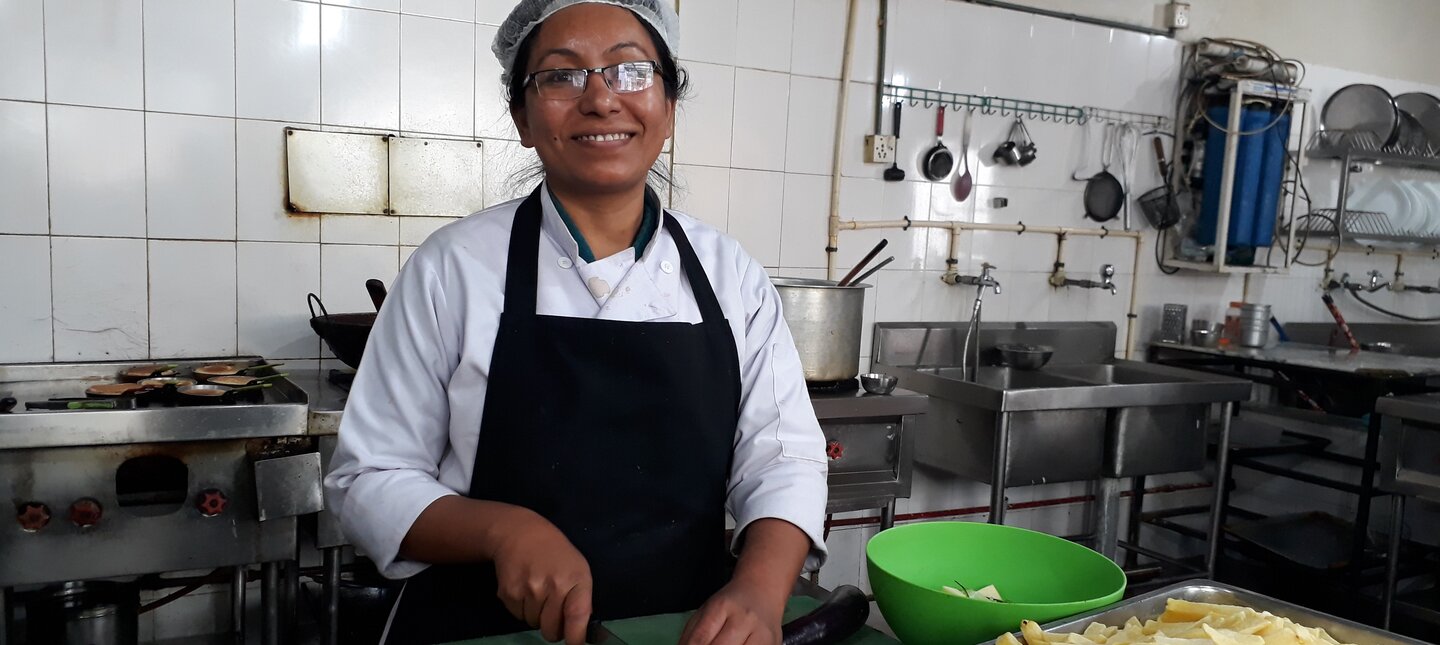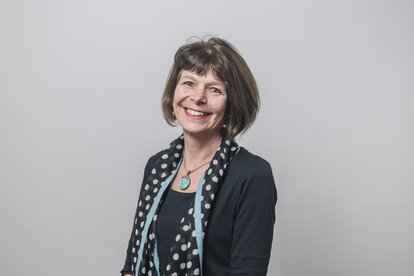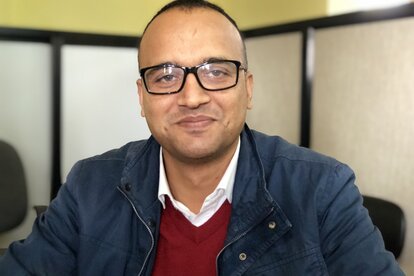Sitting in her cook’s uniform with her hair neatly covered by a cap and a broad smile on her face, Rita Maharajan makes the picture of a happy trainee. She also looks younger than her 38 years. Rita is currently in the final stage of her ten-month professional cook training: a three-month practical placement at the Kathmandu café and bistro Evoke. Becoming a professional cook has, she says, long been a dream; she saw an advertisement for such a training some time ago and applied. Although unsuccessful the first time around, she was selected on her second application.
The project offering the training was the Enhanced Skills for Sustainable and Rewarding Employment (ENSSURE), an SDC project implemented by the Council for Technical and Vocational Education and Training, CTEVT, with technical assistance from Helvetas. Supporting a range of innovative approaches to Nepal’s vocational training system, it draws on a long history of Swiss engagement in the sector - particularly lessons from the Employment Fund, an earlier SDC project, implemented by Helvetas. ENSSURE is introducing on-the-job-training (OJT) and apprenticeships into national curricula – practices that are common in many other countries, but not yet widely accepted in Nepal. The project also aims to be socially inclusive, offering free training to young people from disadvantaged backgrounds, with the target of selecting as many women as men. This requirement explains Rita’s age.
Differential age limits for women and men
One of the lessons of the Employment Fund was that potential women candidates for vocational training tend to marry in their late teens or early twenties. They are then too busy with young children and integrating themselves into their husband’s families to take on training. However, by the age of 30 or so, they are often in a better position to explore employment opportunities outside the home. Hence, although the age limit for supporting men’s training through ENSSURE is set at 35, for women, it is 40. Rita’s situation reflects this reality. She has a five-year old daughter who has recently started school, and her husband, she says, is ready to share care responsibilities. This is important, as they live on the other side of Kathmandu, and Rita’s nine-hour work shift starts at 7am. She has one day off a week, but never at weekends. For this two months of learning, she is unpaid; she merely gets food. However, she has already been offered a job, if she wants to stay.
The employer perspective
Siddhartha Shakya, the day Duty Manager, is highly satisfied with Rita’s work, and indeed that of other trainees they have received through ENSSURE. All were trained at the local Kathmandu Institute of Hospitality Management, and all, he says, have come with a service orientation and sound awareness of hygiene in food handling. This can help raise awareness amongst other staff who have simply learned through experience. Would he employ more women if he could? It is always the same issue, he says: women find it difficult to work anti-social hours, especially during the peak holiday periods – yet this is a “must” in the hospitality sector. One of the provisions in the new Labor Act (2017) is also potentially an issue, although not one he has yet faced. After dark, employers are now legally required to provide transport home for women employees – adding significantly to their cost. On the positive side, women employees are often more reliable, and far less likely to leave for overseas jobs than men.
Thinking positively, learning from mistakes
Evoke is amongst the most “trainee friendly” professional cook placements negotiated through ENSSURE, as illustrated by Rita’s experience in tomato sauce preparation.
“Once I tried to blend a tomato sauce when it was too hot; the heat forced the lid off the blender, splattering sauce everywhere. The Head Chef simply told me that one learns through mistakes, and that now I knew the importance of allowing the sauce to cool first.”
Not all placements have quite such a positive attitude to learning by doing. Unfortunately, also, not all employers in the hospitality sector are willing to take on women, for the reasons given above. This bias is even stronger in the other sectors in which ENSSURE is engaged: construction, electronics, automobiles, and mechanics. It is therefore already clear that in the current phase (to end 2019), the ambitious target of training and ensuring decent employment for as many women as men will not be met. However, the project is learning too. Opportunities for training in skills that avoid reinforcing gender stereotypes, but are nevertheless more “women friendly”, are being identified.



